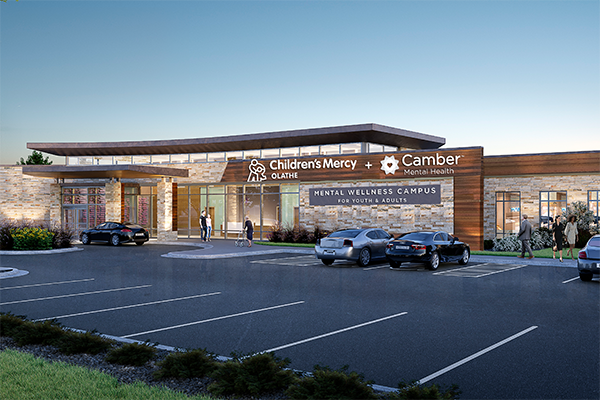- Locations
- How We Help
Overview
As the regional leader in youth mental health treatment, our innovative services help youth achieve health and wellness.
Treatment Programs
- Admissions
Overview
Learn how to admit your child to a Camber treatment location or make a client referral.
- Youth Disorders
- Resources
Overview
Our free resources help you stay informed and educated about mental health, brain development, and childhood trauma as well as how Camber is working toward building healthier communities.
- About Us
Overview
Our philosophy is to provide collaborative, compassionate and effective care through the use of timely, individualized treatment planning.
Learn More About Us
Anxiety

It can be normal for everyone to experience some anxiety as a part of life. You might feel anxious about a deadline at work, conflict with family or friends, moving to a new house, or other life experiences. Children also experience anxiety. They may feel anxious about taking a test, basketball tryouts or the school dance. These moments occur for everyone and stem from feelings of excitement, joy, fear or uncertainty.
When these feelings are no longer temporary and become so big that they’re difficult to manage, that is a sign of an anxiety disorder. With an anxiety disorder, the anxiety gets worse over time and doesn’t go away. It may grow so severe that the symptoms interfere with everyday activities and are reducing a child’s quality of life.
Anxiety is one of the most common mental health disorders in children. With treatment and ongoing support, the symptoms can be significantly reduced or eliminated for most children.
Signs and Symptoms
It can be difficult for a child to understand and explain what they are feeling so it’s very important for caregivers to pay close attention to behaviors. Below is a list of behaviors that may indicate a child or teen is struggling with anxiety.
- Changes in eating habits (such as eating a lot more or a lot less)
- Changes in sleeping habits (such as sleeping more, insomnia or frequent bad dreams)
- Difficulty concentrating
- Complaints of stomach or body aches that aren’t due to a physical problem
- Becoming angry or irritated very easily
- Acting out more than usual, having outbursts
- Feeling restless or fidgety
- Constantly worrying or having negative thoughts
- Crying a lot more than usual
- Clingy behavior or constantly wanting to be held
Types of Anxiety Disorders
The most common types of anxiety that we diagnose and treat in the children and teens we serve include:
- Generalized Anxiety Disorder
- Panic Disorder
- Phobias
- Social Anxiety
- Separation Anxiety
- Post-Traumatic Stress Disorder (PTSD)
![]()
What You Can Do to Help
If you know a child who is struggling with anxiety, here are some ways you can support them:
- Stay calm in front of them. They are often observing how the adults around them react in new, uncertain or stressful situations.
- Teach them ways to self-cope and problem solve when they are in a situation that is making them anxious.
- Don’t encourage them to avoid the situations, people, places or things that give them anxiety. While this may temporarily make them feel better, it will cause the anxiety around those fears to grow larger.
- Help them with some anxiety soothing techniques such as deep breathing, meditation, or other healthy activities that you know help them regulate their emotions.
- Seek professional help. It’s important to have a physician or licensed mental health professional examine the child for an accurate assessment and diagnosis of their physical and mental health.
Camber Children’s Mental Health Can Help
Camber is a network of nonprofit children’s mental health hospitals and residential treatment centers serving youth ages 6 to 18. Each year, we give thousands of youth a safe place to heal, build resilience, and overcome struggles with mental health conditions. Our compassionate team of psychiatric, medical and behavioral health professionals provides a nurturing and therapeutic experience along with a treatment plan tailored to meet each child’s individual needs. The goal of our treatment programs is for each child to safely return home with the resources and supports in place to live a healthy and happy life in their community.
If you’re concerned that a child in your care is struggling with anxiety or other mental health needs, call Camber at 913-890-7468. We’re available 24/7 to answer your questions.
Here are some Camber resources to help you understand and cope with anxiety:
- Watch a recorded webinar about anxiety diagnosis, care and treatment [VIDEO]
- Get tips for managing anxiety [VIDEO]
- Make an emotion regulation plan to identify triggers and helpful coping skills
- Ease feelings of anxiety with this progressive muscle relaxation exercise [VIDEO]
- Learn how psychiatric medication and therapy can be combined to reduce anxiety
- Use these easy deep breathing techniques when feeling overwhelmed [VIDEO]
- Get tips on how to manage pandemic stress and anxiety
- Practice these simple yoga stretches to release some tension [VIDEO]
Here’s a list of additional resources you can contact:
- Call the child’s primary care physician or your local community mental health center
- Visit the Anxiety & Depression Association of America website at adaa.org
- Text HOME to 741741 for 24/7 support from the Crisis Text Line
- Call the National Alliance on Mental Illness helpline at 800-950-6264 or visit their website at nami.org
- Call the 988 Suicide and Crisis Lifeline at 988 or 988lifeline.org
- Learn more about anxiety disorders from the Child Mind Institute
Share this information with your support system! View and download this information as a PDF.





